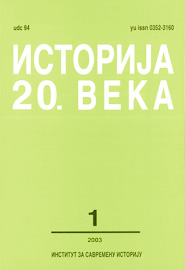Author(s): Bojan B. Dimitrijević,Ljubomir Petrović,Ranka Gašić,Ivana Dobrivojević Tomić,Dragan Cvetković,Kosta Nikolić,Goran Latinović,Bojana Dujkovic-Blagojević / Language(s): Serbian
Issue: 1/2003
Reviews of:
1. Горан Давидовић, Милош Тимотијевић, 3АТАМЊЕНА ПРОШЛОСГ. ИСТОРИЈА РАВНОШРАЦА ЧАЧАНСКОГ КРАЈА 1941-1945. Издање локалних музеја Чачак-Горњи Милановац-Кралево, 2002, сtр. 415
Review by: Bojan B. Dimitrijević
2. Едвард Халет Кар, ШТА ЈЕ ИСТОРИЈА, Уметничко друштво Градац, Чачак - Београд 2002, стр. 112.
Review by: Ljubomir Petrović
3. Весна Алексић, БАНКА И МОЋ. СОЦИЈАЛНО - ФИНАНСИЈСКА СТОРИЈА ОПШТЕГ ЈУГОСЛОВЕИСКОГ БАНКАРСКОГ ДРУШТВА А. Д 1928-1945, Сгубови културе, Београд 2002.
Review by: Ranka Gašić
4. Љубодраг Димић, Никола Жутић, Благоје Исаиловић, ЗАПИСНИЦИ СА СЕДНИЦА МИНИСТАРСКОГ САВЕТА 1929-1931, Архив Југославије, Службени лист, Београд 2002, str. 411
Review by: Ivana Dobrivojević
5. Milan Bulajić, JASENOVAC - JEWISH SERBIAN HOLOCAUST (THE ROLE OF THE VATICAN) IN NAZI-USTASHA CROATIA (1941-1945, Фонд за истраживање геноцида и „Стручна књига”, Београд 2002, стр. 655
Review by: Dragan Cvetković
6. Коста Николић, САВРЕМЕНИЦИ О ГЕНЕРАЛУ МИХАИЛОВИЋУ, Бонарт, Нова Пазова 2002, стр. 277
Review by: Dragan Cvetković
7. Момчило Павловић, Божица Младеновић, КОСТА МИЛОВАНОВИЋ ПЕЋАНАЦ. БИОГРАФИЈА Институт за савремену историју, Београд 2003, сгр. 362
Review by: Kosta Nikolić
8. Вељко Ђурић Мишина, СРПСКА ПРАВОСЛАВНА ЦРКВА У НЕЗАВИСНОЈ ДРЖАВИ ХРВАТСКОЈ 1941 1945, DIJAM-M-pres, Ветерник 2002,. стр. 192 (+100 стр. прилога)
Review by: Goran Latinović
9. Џон М. Робертс, ЕВРОПА 1880- 1945, Клио, Београд 2002, стр. 706
Review by: Bojana Dujkovic-Blagojević
More...

